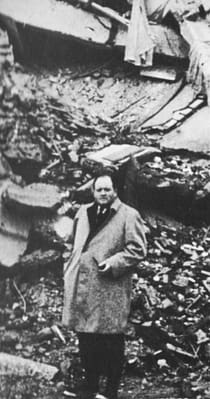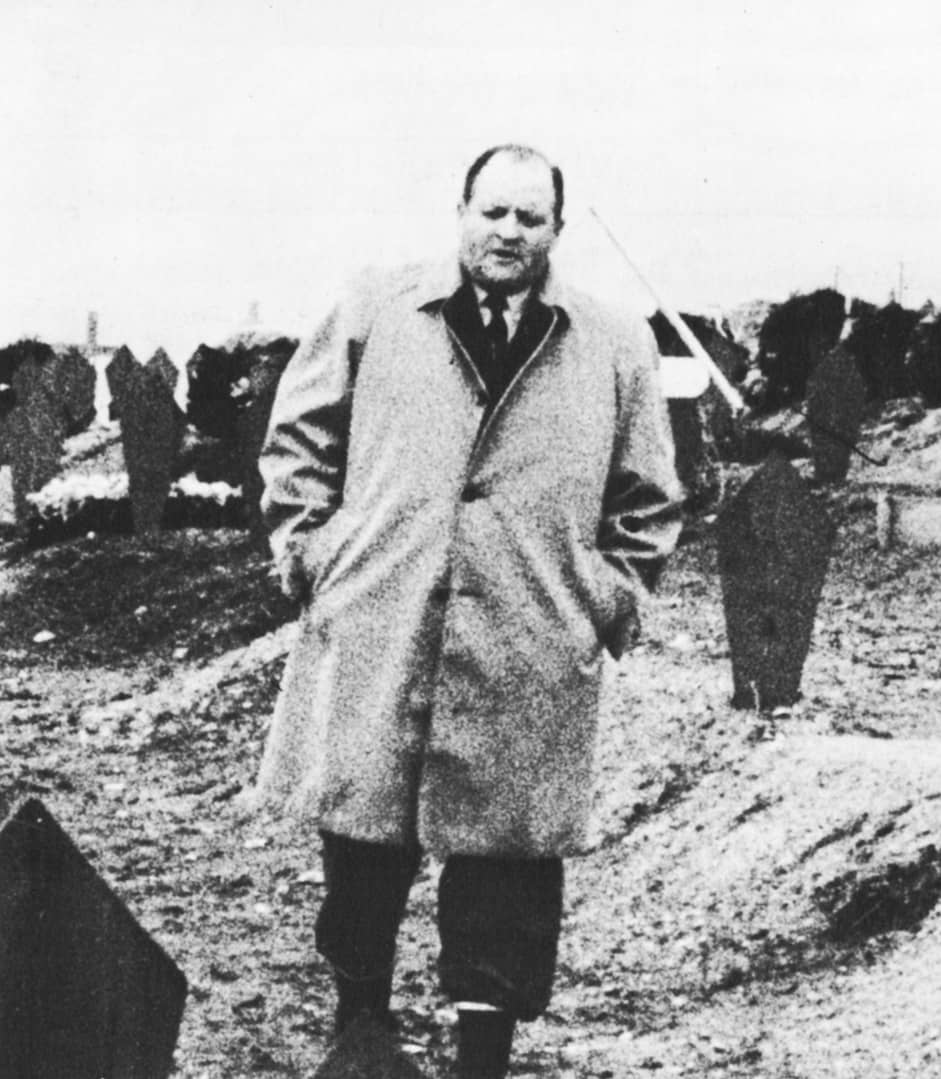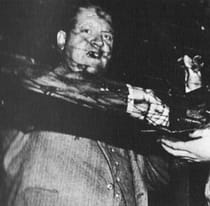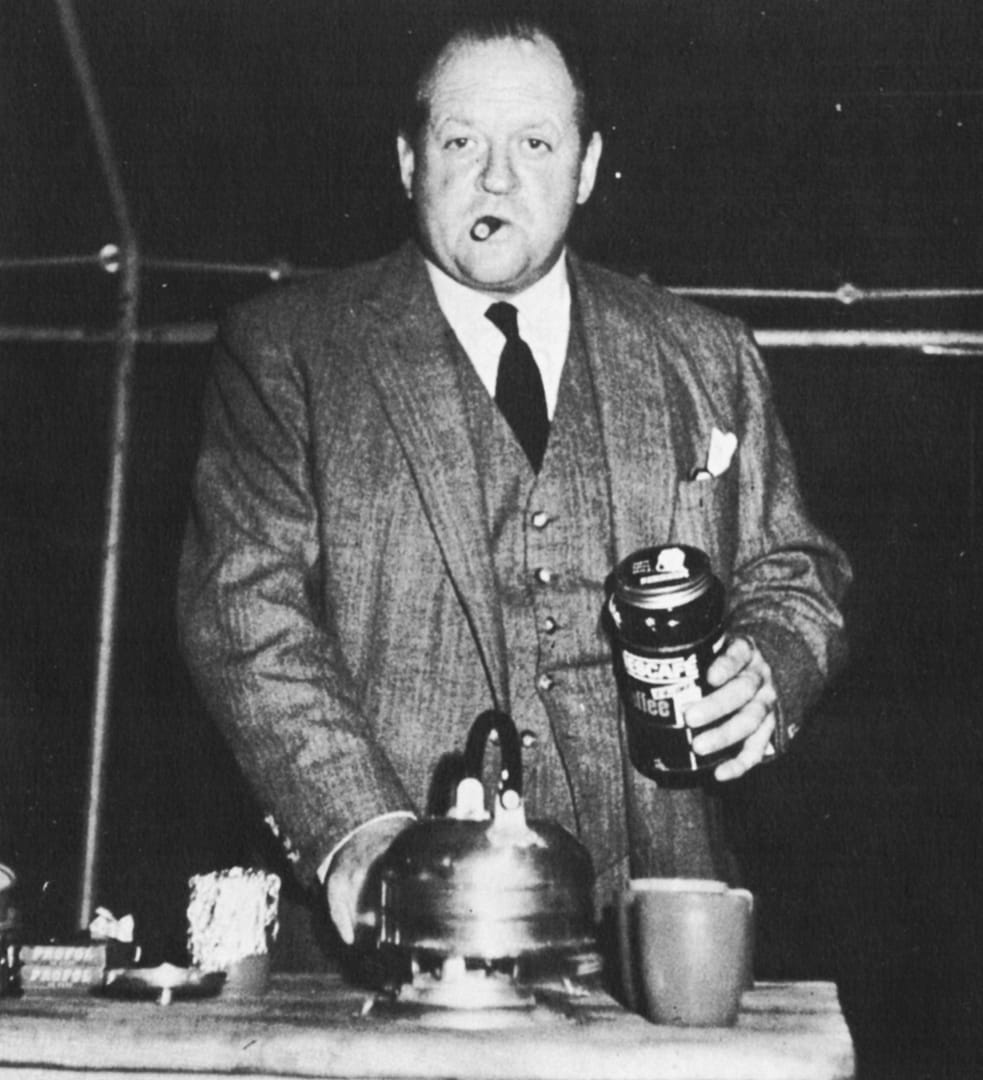Again the response was immediate and overwhelming. The original target was £100,000. Within a week it had passed £230,000. The total was again over £400,000. The BBC had used its own prestige and that of Richard Dimbleby to challenge the public to respond in a time limit and the response had been magnificent. Dimbleby was convinced that the viewers were owed a report on the use to which the money had been put. With David J. Webster as producer, and a camera team, he went to see Skopje for himself and for Panorama’s viewers:
‘The real tragedy of Skopje hits you and hits you very hard when you come to this cemetery on the side of the hill just outside the city. Particularly when you come on a day like this with low cloud in the sky and driving rain blowing across everything. Because this is where they brought eleven hundred men, women and children and a lot of tiny babies and buried them all in these trenches, giving each one a simple spade-shaped red headboard.’
It was with these words that Richard opened the film that we made together in the aftermath of the Skopje earthquake of August 1963 as he walked slowly through the fresh graves on the side of a Macedonian hill. This was a very different Richard from the urbane figure to whom we had become accustomed as he presided over State occasions. At Skopje he found again his old role as a brilliant reporter covering a story of misery and suffering with distinction and with feeling.
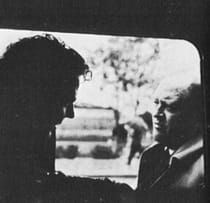
In Skopje more than eleven hundred people had died and 80 per cent of the city had been destroyed. Those who were left were threatened with floods. The four members of the Panorama team were sharing a tent provided by one of the relief organisations. There was a lot of water in it and like the rest of the town we were in danger of being swept away. Richard slept at the end nearest the swollen river and it was agreed that if he sailed past us during the night we would all take it as a signal to leave.
He was not well, his back troubled him, but he remained totally professional and unflustered. He was the only one of the team who had enough common sense to bring not only brandy and instant coffee but a tiny stove on which throughout our stay he brewed the mixture and provided us all with our breakfast.
To many people Richard Dimbleby seemed to represent authority and officialdom. They would not have got that impression in Skopje. His overwhelming feeling was to break through the bureaucracy and the petty barriers which stood between the Macedonians and the relief of their suffering.
Richard did his best reporting when he was dealing with ordinary people. The solidity of his personality and his authority were an effective counterpoint to the sad and chaotic. He mediated between the suffering of this remote land and the concern of a more comfortable Britain. One of his strongest characteristics was that of reassurance. There are many stories in which you just don’t want reassurance, but at Skopje it was this which gave his work a special quality. Standing in ruin he seemed an emissary from a more ordered and rational world who would see that something was done to help, and done soon.
Barto Stuart was in charge of the young British volunteer engineers and specialists who were helping rehouse the thousands of Skopje’s homeless. He recalls:
When I brought Richard and his Panorama team from the wrecked railway station to my Headquarters tent we found the entire humble establishment awash after heavy rainstorms. There was Richard in gum-boots and candlelight, wading in water almost up to his knees, with spanner and screwdriver cheerfully engaged in making up his ex-Army bunk for the night. His arrival in the midst of a terrible human tragedy brought a ray of sorely lacking common sense and sanity. I still see him, cigar in mouth, and feet in water, brewing coffee on his tiny camping stove, one cup at a time, for everyone present. His terrific humour and charm made us all forget – for a few hours at least – the tragedy outside, our own anxieties and the chilly damp cold everywhere around us. He was not an awe-inspiring figure but a dear friend and father, and a very accessible giant among men.
When he left after an all too short five-day stay he managed to secure a compartment for his team and equipment. He placed himself at the carriage window which happened to be shaped like a TV screen. Quickly realising its potential, he began an unforgettable 10-minute miming act. As the train finally departed Richard still stood framed in his screen, making the craziest faces, and his newly made friends and admirers had tears of non-stop laughter and affection running down their cheeks. We had witnessed a performance which I still consider on a par with the best mimes of Charlie Chaplin or Norman Wisdom.
Immediately on return he spent a whole day telephoning wives and mothers of all my volunteers at Skopje giving messages and telling them of the work we were doing. What he did not add was that without himself and his appeal there would never have been any British relief work at Skopje.

